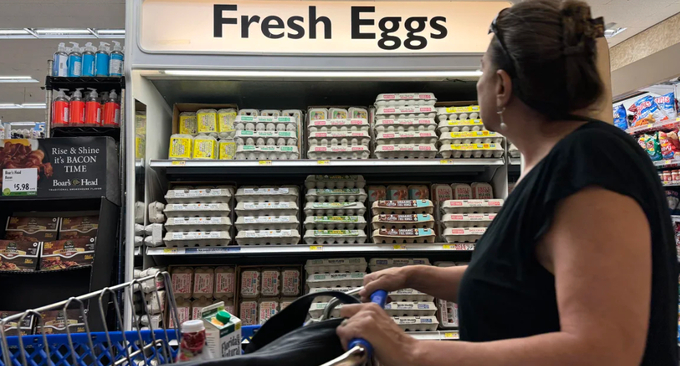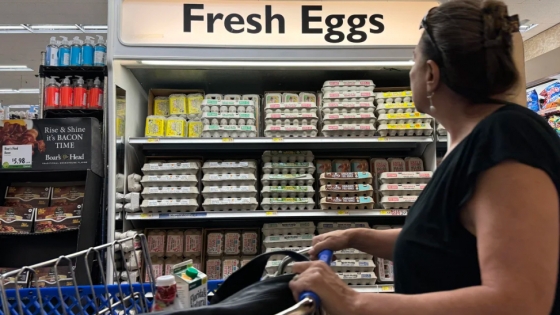(VAN) Egg prices have risen steadily over the past two years. A spike in avian flu and the approaching holiday season are combining to make the problem even worse.

A customer walks by a display of fresh eggs at a grocery store in San Anselmo, California on September 25.
“Thanksgiving (dinner) is the same price this year as last year overall, except eggs. The one little spike that we’re seeing,” said Stew Leonard Jr., CEO of Steward Leonard’s, a family-run northeast grocery chain with eight locations.
Egg prices at the grocery store were up 30.4% in October from the year prior, according to the consumer-price index.
Increased demand from holiday cooking makes egg prices even more volatile.
“The holidays are always the highest retail sales season of the year because if you think about your holidays, your baking, your cooking, you’re entertaining, all of those require extra eggs,” said Emily Metz, president and CEO of the American Egg Board.
And the supply of eggs is down, too. Avian flu, which is spread through wild birds, has been plaguing farmers and egg supply since January 2022. The virus has killed 108 million birds since then, and 75 million of those were laying eggs, according to the American Farm Bureau Federation. That’s impacted 8% of the nationwide supply.
Cases started to spike again last month, with avian flu killing 2.8 million egg-laying birds in the key egg-producing states of Oregon, Utah and Washington. That’s a projected loss of about 60 million eggs, according to a report by the US Department of Agriculture.
“Our egg prices really ride the waves associated with high influenza,” said Bernt Nelson, an economist with the American Farm Bureau Federation. “Eggs are one of those products where we see a lot of price volatility at the retail level. We see that go up and down quite a bit and there’s a lot of competition with it.”
The supply of eggs has also been revised down for the first quarter of 2025, the USDA notes, which will likely keep prices higher.
At least a few supermarkets are trying to absorb some of the increases for now. Leonard Jr. says he’s chosen to keep prices lower so customers don’t reach a “breaking point.”
The average cost of a dozen wholesale large white cartoned eggs on the New York wholesale market was $4.23 as of November 15, according to USDA data. Last year around the same time it was $2.43 a dozen, a 54% increase on wholesale eggs.
Grocers are then left to decide what price to sell eggs. It’s a delicate dance between how to make a typical profit without scaring away customers to a competitor.
“I can’t go over $4.99 (a dozen) on the eggs right now, even though our farmer may say he’s raising the price 10 cents,” said Leonard Jr. “I’ve found overall it’s a challenging year for the retail food industry. Expenses are going up faster than what the market will allow you to charge. And I think at least with us, our margins have gone down.”
Morton Williams, a New York City grocery store chain with 17 locations, saw wholesale egg prices shoot up by $2 in just a few weeks this past October. And when egg prices go up, they don’t get cheaper later on.
“It’s been out of control. Eggs used to be dirt cheap. They go through the roof, and then when they come back down, they’re still higher than that earlier point,” said Steve Schwartz, the director of sales and marketing for Morton Williams.
On October 2, Schwartz said he was paying $2.16 for a dozen eggs from his supplier. By October 28, it was $4.28 a dozen.
“There were many a weeks in there where we were working on little to no margin,” said Schwartz.
Commodity eggs have increased in price so much so that they can be nearly the same price as organic eggs.
“We have a dozen normal white eggs at five bucks. Now if you want to go to organic, it’s the same price,” said Leonard Jr.
Consumers tend to buy organic or pasteurized eggs around the holidays, believing it makes their food taste better, Leonard Jr. said. Now that they are nearly the same price as regular eggs, demand could put even more pressure on supply.
“Since everybody goes for the ‘better egg’ it puts a strain on that supply, because nothing’s been forecasted for something like that, and then the warehouses get shortages,” said Schwartz.
Store-bought shelf products that are made with eggs could also start to see future spikes in prices, warns Schwartz.
“If eggs stay high, you get that ripple effect,” Schwartz added. So many products are made with eggs, ranging from pasta to mayonnaise, he said, that their own prices could be affected down the line.
“It’s all based on what’s going on. And that’s why mayo is so expensive now, from all the other times this has happened.”
Agriculture News | Agri Products Price



